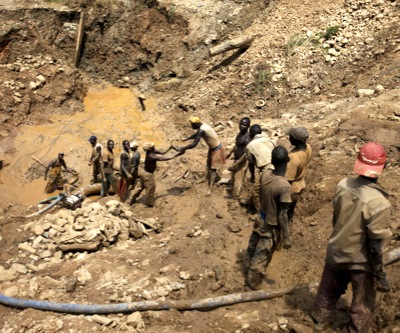Carmakers invite action on conflict minerals rule as May deadline looms

At a corporate responsibility summit for global automakers and suppliers near Detroit, the Automotive Industry Action Group (AIAG) today announced an initiative to accelerate action on conflict minerals, which was identified in a new survey as the most significant issue facing the industry this year. The 2014 AIAG Global Automotive Corporate Responsibility Survey of more than 550 professionals working on corporate responsibility (CR) in automotive, manufacturing, and other industries in 40 countries illuminates the progress the industry has made on CR initiatives while also highlighting areas for improvement.
According to the survey, nearly half of companies polled have a policy on conflict minerals reporting—yet only half of those companies with a policy said they will meet the May 31 deadline to file a Conflict Minerals Report with the U.S. Securities and Exchange Commission, as required by law. The survey also revealed that AIAG member companies are more likely to have a conflict minerals policy, and more likely to meet the reporting deadline.
To accelerate industry action on the issue, AIAG launched today a conflict minerals awareness campaign with a microsite that simplifies this complex issue. It is the latest of AIAG’s industry-leading tools that provide automotive OEMs and suppliers unlimited access to the resources and best practices needed to ensure that global vehicle production does not support armed conflict in central Africa, where conflict minerals are often mined.
Overall, more than seven in 10 survey respondents said CR is a significant priority at their companies, including issues related to business ethics, energy use/conservation, environmental emissions, reporting and supply chain transparency. The survey also found that:
Reducing energy use and waste are the most important environmental goals
- More than 70% of survey respondents said it was most important to meet reduction goals for energy use and waste, followed by water use, air and greenhouse gas emissions
- With that said, more than a third of the companies surveyed have already met their reduction goals in energy use and waste, while more than 70% of companies surveyed have sufficient data to benchmark operations in these areas
Practices are in place to ensure responsible working conditions
- Nearly 80% of companies surveyed have a policy or expectations for responsible working conditions
- If mandated, more than half of the companies (57%) surveyed can demonstrate that their supply chain does not include the use of forced or trafficked labor.
The benefits of corporate responsibility reporting are recognized, but there is an opportunity to make the practice more common and rigorous
- Only 30% of companies produce a CR report, and 8% plan do so—less than the sum of those that don’t produce a report (19%) or don’t know if their company produces a report (43%).
- Of those who do report, only 23% use the Global Reporting Initiative (GRI) Framework. The majority (67%), don’t know if the GRI Framework is used.
“The survey confirms that the global automotive industry is focused on significant corporate responsibility issues and is making important progress,” said Tanya Bolden, corporate responsibility program development manager at AIAG. “It also reinforces the need to work together and intensify our efforts in other areas.”
The full report of the 2014 AIAG Global Automotive Corporate Responsibility Survey includes detailed findings, methodology and information on the types of companies represented by respondents.
About AIAG
AIAG is a unique not-for-profit organization where, for more than 30 years, OEMs, suppliers, service providers, government entities and individuals in academia have worked collaboratively to drive down costs and complexity from the supply chain via global standards development and harmonized business practices. AIAG membership has grown to more than 1,000 members and includes renowned manufacturers, and many of their parts suppliers and service providers. For more information, visit www.AIAG.org.
{{ commodity.name }}
{{ post.title }}
{{ post.date }}




Comments